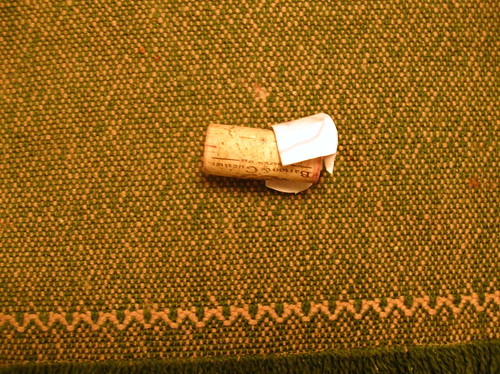Two delightful things happened today.
First, Margaret decided we ought to be together tomorrow weekend, so she’s coming up to Evanston for a long weekend.
Second (though earlier), David Efird followed up our earlier conversation about cartoons, etc., with some modal-logic notes on my post on God and games. I had observed in passing that a true-to-life game-designed God would need to be undetectable — and why would one put in the effort to design an undetectable feature of the game?
David notes, à propos this point, “[This] reminded me of an atheological argument I’ve thought quite a lot about in the last few years, the so-called problem of divine hiddenness resurrected in recent years by J.L. Schellenberg:
(1) If God existed, then he would be unsurpassably great, and this property entails his being perfectly loving.
(2) If God were perfectly loving, then God would ensure that every person capable of a personal relationship with him would reasonably believe that God exists, unless that person culpably lacks such a belief.
(3) But there are people who inculpably lack this belief.
(4) So, God does not exist.
Premise (1) seems true, and premise (3) also seems true (I take it the sort of things that would prompt your quote also support (3)). So premise (2) is where the dispute seems like it should occur between the proponent of the argument and the theist. But it does seem at least somewhat plausible especially when one factors in circumstances involving horrendous evils (i.e. evils the experience of which would make the sufferer reasonably wish she had never been born). It seems as if God as a loving parent would wish to comfort such sufferers and that at least some of them would be capable of a loving relationship with God; it also seems implausible to suggest that God’s not doing so is always a result of some culpability in the sufferer. Of course the theist then appeals to some sort of second-order hiddenness to explain the reasonableness of God’s remaining hidden, i.e. the reason that God remains hidden in such circumstances is also hidden from us because we cannot, as finite knowers, comprehend the goods, evils and their relationships generally and particularly in such a difficult circumstance. And then of course the atheist is unconvinced. But when has one side ever convinced the other in disputes such as these?”
What fun, when a casual meditation on divinity and intelligent (game) design should invoke so thoughtful a response! So I wrote back, saying that “I always resist premises that presuppose what we know would be the case if X. My everyday experience suggests that we (even philosophers!) are not reliably good at drawing inferences from data immediately at hand — how much more cautious should we be about proposing what must be the case relative to the motivations and characteristics of a persona not immediately known to us (or, if sometimes immediately, at least not uncontrovertibly) one of whose posited characteristics entails being qualitatively different from us?”
David gently pushes back, “Your response to the puzzle of divine hiddenness (from a theistic point of view) is a very reasonable one. Indeed, there seems to be some precedent in Peter van Inwagen’s (a prominent philosopher of religion and philosophical theologian at Notre Dame) modal scepticism: we can make reliable modal inferences/judgments about matters close to home (about whether the table might have been two feet to the left) but when we venture to more esotetic matters, they become unreliable. This may be a case at hand.
“But on the other side, one might think that in this case, the inference doesn’t seem too far removed from home for if God is like a good parent, then we can make, it seems, certain judgments about how God should act in certain circumstances. If a child were lost in a wood, frightened and alone, it seems plausible that if the child’s mother were around, and she happened to be a good mother, she would make every attempt to make herself known to the child. If a child had to go through a terrible medical procedure in order to be cured of something more terrible, e.g. having to undergo a bone marrow transplant, the child’s parents, if they were good parents, would make every effort to comfort the child, which requires, minimally, them making themselves present to the child. If God really is like a good parent, then it seems God should make every effort to make himself known to his children and especially to to those children who suffer undeservedly. This seems to be a core meaning of what it is to be a good parent. And since God is omnipotent, omniscient and omnipresent, it is then a pressing issue for how God, as a good parent, could consistently allow his children, who sometimes suffer horrendous evils, to reasonably think themselves alone.
“So, it seems to me that the problem of divine hiddenness, when added with the problem of horrendous evils, is quite a potent problem for Christian theism, to which, it seems to be, the best (only) response the theist can make is to postulate a further level of hiddenness, i.e. that of the goods, the evils and their relationships, and to say that by making himself known God would thereby cause an evil equally bad or worse than that caused by one of his children suffering alone. The theist, then, it seems must insist on an afterlife of bliss for all who suffer such horrendous evils, and worse, are not comforted by their heavenly Father for (good) reasons. This would then seem to entail universalism about salvation. (To the logical problem of hell, i.e. how is it logically possible that God, as traditionally conceived, damn someone to hell?, I see no plausible solution.)”
I was pleased that David associated my position with Peter van Inwagen; I’ve found several of his essays very helpful to my thinking, and it’s reassuring to hear that a professional philosopher recognizes some kinship between what I say and what van Inwagen says.
But it’s the end of the week, Reading Week is about to begin, and my brain has turned altogether to mush. I’ll think more tomorrow, or sometime, but not tonight, except about Margaret coming back.


